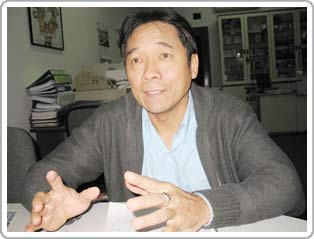Why are Vietnamese students weak in applied science?
Compared to international friends of the same age, Vietnamese students are not good at natural science and do not understand much about the application of science in practice.
Tien Phong had a conversation with engineer Nguyen Quang - the host of the Funny Science (Vietnam Television) on this issue.
Experts say that the weakness of Vietnamese students is the ability to apply in the learning process. As a person who has lots of contact with students in programs about applied science content, what is your opinion?
I see Vietnamese students do not know much about natural science, especially applied science. Not because they are poor. In fact, they are smart, but have little access to science.
In the countries that I have come to and learn about (Europe, Australia), every school has a laboratory, and students learn with good teachers in natural science.

Engineer Nguyen Quang (Photo: Tienphong)
In us, the lack of learning conditions has made it possible that even teachers are not good at applied science. Therefore, they do not answer questions about their natural phenomena, discouraging them from asking questions.
The school is only a part. In fact, they live in an environment where there are not many good adults in science. I see Vietnamese people are very good, but they are good at maths, in theory science.
Maybe they do the thesis very well, but the scientific application in life is not confident. Very few men repair their own cars, as well as a few men who have kits, drills, folding ladders . in the house. Meanwhile, most Australian men have these things. In order to do the work yourself on the drill, the ladder, the kit . people need to have applied scientific knowledge.
Where children are, are curious, like to explore. But in me, that curiosity was not encouraged properly.
In a conversation with students about recent applied science, did you say that if you are good at science you will be healthy, rich, happy .
I see that. Our students are very ignorant of protecting health and preventing accidents. Once, I saw a 14-year-old boy sagging when riding a bicycle and falling.
If he is good at science, he will not do it. Because on the surface of the road that boy is walking with lots of sand. If the hammock is hit, the wheel will approach the horizontal road surface on the grains of sand, so it will slip, and all vehicles will fall. That is Physics knowledge.
Or if you have knowledge of Biology application, you will be able to distinguish viruses from germs, be aware of how scary the virus is, but not to the extent of being afraid, stigma and isolation of HIV / AIDS-infected people. etc .
On the other hand, when you are good at applied science, growing up, you will have many ideas that will bring those ideas to life. Good at science, you will make yourself a happy life, easily overcome many difficulties ahead.
Science helps us to reason. I believe that a person who knows science will think more logically and discover many interesting things in his own life.
Another obvious benefit is that when future generations of citizens are good at applied science, the quality of the future community will be improved. For example, they will know how to protect the environment, manage better science and technology projects.
We do not need to be a scientist to understand science. Just pay attention to science, we can have this knowledge richly whether we are an accountant or a housewife.
According to him, how should students like and be good at applied science?
This is a big and social issue. A society that does not properly understand the application of science in practice, the future generation will of course be affected. Moreover, our difficult economic conditions greatly affect the method of teaching in schools.
I went to foreign schools and schools right in Vietnam and found in their classrooms many models and pictures: solar system, world map .
In each classroom, there is a small library with many books and newspapers. They create a very lively learning environment. Teachers are very good at science.
During school hours, teachers do not stand on the podium to speak but sit down and share with students. Every year, the school organizes a science fair. There, students are allowed to do their own experiments, present themselves and protect a certain theory on their own.
What about our class? Only tables, chairs and blackboards. How effective, one-way teaching points to new tests or exams that cannot be assessed through daily interaction.
Of course, if teachers are well aware of the application of science in practice, the level of teachers is improved, they will find ways to help students love science.
Thank you Sir!
You performed
- Two Vietnamese students are invited to attend the world's largest scientific conference
- Vietnamese students win international scientific prizes
- NASA Director General encourages Vietnamese students
- Vietnamese science stands before unprecedented opportunities
- Vietnamese students win international prizes
- NASA supports the training of Vietnamese students
- Hanoi students are excited about the science quiz
- Foreign researchers have figured out the reason why Vietnamese students always achieve extremely high scores in examinations
- A second prize of the Vietnamese intellectual 07 is invested 75 million VND
- Vietnamese students have the opportunity to become
- All 4 Vietnamese students won the International Chemistry Olympiad prize
- Vietnamese students' boredom of the 2009 Robocon exam
 Vietnam 5th Asian champion on fuel-efficient vehicles
Vietnam 5th Asian champion on fuel-efficient vehicles We can read all NASA studies completely free of charge
We can read all NASA studies completely free of charge Singer and songwriter Bob Dylan won the 2016 Nobel Prize for Literature
Singer and songwriter Bob Dylan won the 2016 Nobel Prize for Literature Scientific revolution in Asia
Scientific revolution in Asia